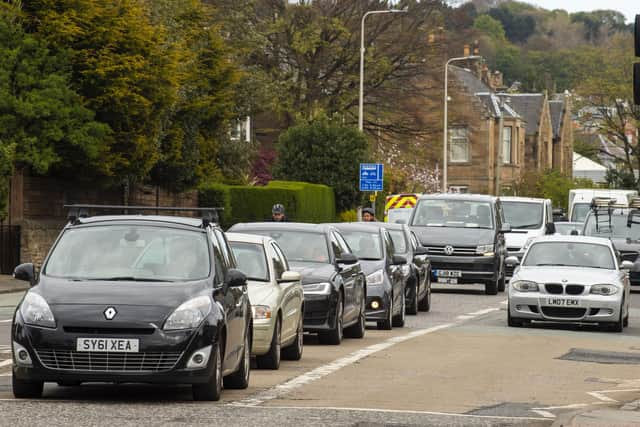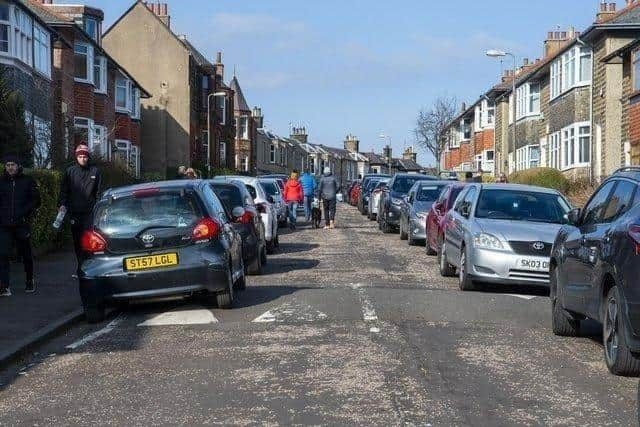Edinburgh council elections 2022: All the changes facing Edinburgh drivers like congestion charge, workplace parking levy and residents' parking charges
and live on Freeview channel 276
Let us know what you think and join the conversation at the bottom of this article.
The SNP, which has led the council for the past five years and is tipped to be the biggest party again, has put forward the controversial package and says it would enable more investment in public transport and make it easier for everyone, including motorists, to get around.
But opponents claim the proposals penalise motorists without any guarantee of improvements in return.
Advertisement
Hide AdAdvertisement
Hide AdThe congestion charge, expected to be around £2 or £3 a day, would apply to commuters coming into the Capital at peak periods, with a promise Edinburgh residents would not have to pay it. The workplace parking levy is likely to require companies with over 50 parking spaces to pay around £500 a year per space. And plans are already in the pipeline to create more controlled parking zones, where residents pay for permits, in several areas of the city.
SNP group leader Adam McVey said: “These are the right plans to tackle congestion in our city. Edinburgh is difficult to drive in and we have to face up to that. We have set out a very holistic plan to charge some of the biggest companies, those with with 50 or more spaces, and we would look at conditions to make sure that wasn't passed on to employees. That's about getting the biggest businesses to take responsibility for how people are getting to and from work and also create revenue that we can invest in some of the public transport options we know people would prefer to take. The congestion levy is similar. It’s about making sure people can drive around more easily in the city.”
And he challenged other parties: “If not our plans, how are they proposing to tackle congestion? Our policies are not only going to make it easier for people to walk or take public transport, it will make it easier for people who have to drive as well.”
Many communities plagued by commuter parking had been “crying out” for more parking controls, said Councillor McVey. But he accepted: ”We need to listen to communities about the specifics.”


Advertisement
Hide AdAdvertisement
Hide AdLabour, the SNP’s coalition partners in Edinburgh for the past five years, are non-committal on the proposals. The party’s manifesto talks about working with business and neighbouring local authorities to find a solution to commuter parking, including better public transport and park and ride.
Group leader Cammy Day said he wanted to see the details of the SNP’s plans. “Our worry is, at the time of a cost of living crisis, the last thing we want to do is put a charge on workers who need to take their car into work, for example care workers who might need to travel around the city.”
The Tories are opposed to the SNP transport package. Group leader Iain Whyte said: “We can only think they are hopeful of a good result because of national issues and the public won’t notice what they’re doing locally and they’ll then claim that’s some kind of justification for these things. I’m fairly certain these are all pretty unpopular and a triple whammy on motorists won’t go unnoticed. It could be really damaging for small businesses and people who need a vehicle to combine family and work life.”
Ian Maxwell, of cycle campaign group Spokes, said the measures could help achieve what Edinburgh needed – less private motor traffic, less pollution and more walking and cycling.


Advertisement
Hide AdAdvertisement
Hide Ad“Although seen as controversial policies, they are ones which have worked well in other places and it's a great shame that Edinburgh turned its back on congestion charging when it was proposed before.” The Capital voted three to one against a congestion charging scheme in a referendum in 2005.
Mr Maxwell said experience elsewhere was that once a congestion charge was introduced people were happy with it because of the impact it had.
“We would be supportive of all these measures and we feel the opposition to them is not based on solid ground. People think Edinburgh businesses will suffer because of it but experience elsewhere is that businesses actually benefit from this change in the way people move around in a big city. In New York, for example, in Manhattan they did quite extensive studies on the takings of retail businesses and also on the impact of these sort of measures on the speed of traffic. They found all these scare that were put up in opposition to them were unfounded.
“Edinburgh probably has the best public transport in Scotland if not in the UK. Often the restraints on public transport are caused by congestion from private motor vehicles. If we had less private traffic we could have a more effective public transport system. And while private transport in rural areas is going to continue to be necessary, in a major city like Edinburgh there could be a vast reduction in the number of private cars without having any noticeable effect on people.”
Advertisement
Hide AdAdvertisement
Hide AdBut Neil Greig of motoring organisation IAM Roadsmart, was sceptical about the impact of the measures. "You really have to attract people out of their cars rather than tax them out of their cars. And Edinburgh doesn’t have a great track record in delivering things that attract people out of their cars. Even though we've got the trams and a very good bus service in Edinburgh, we’ve still got record traffic congestion because people still feel they have to use their car.”
Most of the measures had been talked about before, he said. “But when you put it all together and start to think it’s actually going to happen, that might make people think what are they getting out of this. If they pay a workplace parking levy, can they trust the council to deliver what it says it's going to deliver? That's always been the trouble with local authorities: they take in the taxes, increase the parking charges, but they never seem to increase the level of service.”
Comment Guidelines
National World encourages reader discussion on our stories. User feedback, insights and back-and-forth exchanges add a rich layer of context to reporting. Please review our Community Guidelines before commenting.